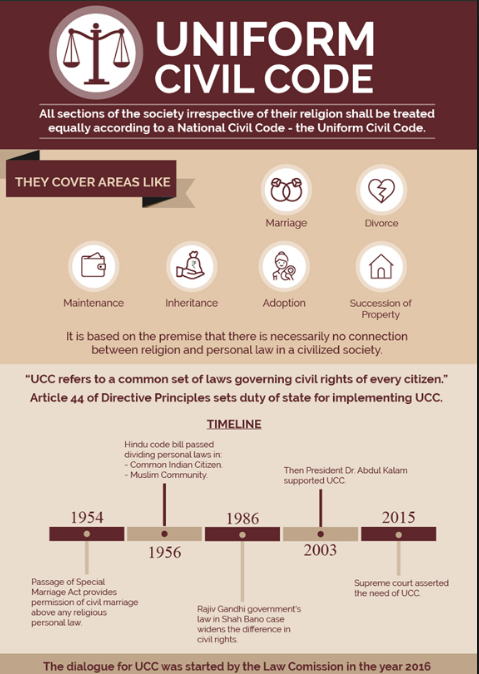WHAT IS UNIFORM CIVIL CODE ?
- Briefly explain what the UCC is and its significance in the Indian context.
- Provide an overview of how the UCC aims to replace personal laws based on religion with one common law for all citizens.
Uniform Civil Code in India: A Comprehensive Guide to UCC, Personal Laws, and Current Debates
I. Introduction
- Briefly explain what the UCC is and its significance in the Indian context.
- Provide an overview of how the UCC aims to replace personal laws based on religion with one common law for all citizens.
II. Historical Background
- Provide a detailed history of the UCC, starting from its origin as part of the Hindu Code Bill in 1949.
- Explain how the UCC has evolved and expanded over the years to cover all religions.
- Include key milestones and debates surrounding the UCC, highlighting significant events, political discussions, and social movements.
III. Personal Laws Based on Religion
- Provide a comprehensive list of personal laws currently based on religion in India.
- Explain these personal laws in detail and provide examples where necessary.
- Discuss the legal and social implications of having separate personal laws for different religious communities.
IV. Arguments For and Against the UCC
- Present the arguments in favor of implementing the UCC, such as promoting gender equality, social cohesion, and uniformity in law.
- Present the arguments against the UCC, focusing on concerns regarding cultural diversity, infringement of religious freedom, and potential challenges in implementation.
- Include quotes and perspectives from legal scholars, activists, religious leaders, and politicians on both sides of the debate.
V. Challenges in Implementing the UCC
- Provide a detailed analysis of the challenges in implementing the UCC.
- Explore the practical difficulties in drafting a common law that satisfies the diverse religious and cultural practices in India.
- Discuss potential issues related to the uniformity of laws across religions and the impact on existing personal laws.
- Highlight objections and concerns raised by various communities and stakeholders.
VI. International Comparisons
- Compare the Indian legal system with other countries that have implemented a Uniform Civil Code or similar legal frameworks.
- Discuss the experiences of these countries and their successes or challenges in implementing a common civil law applicable to all citizens.
VII. Current Status and Future Prospects
- Discuss the current status of the UCC in India and any ongoing or proposed initiatives or reforms.
- Explore potential compromises or alternative ways to address the issues related to personal laws and religious practices.
- Provide insights into the future prospects of the UCC, considering the evolving social, political, and legal landscape in India.
VIII. Conclusion
- Summarize the key points discussed in the article.
- Offer a balanced conclusion, considering both the advantages and challenges associated with implementing the UCC.
- Encourage readers to further explore the topic and stay informed about developments regarding the UCC.
By following this outline and providing comprehensive information for each section, you will be able to expand the article on the Uniform Civil Code to the desired word count.






0 Comments